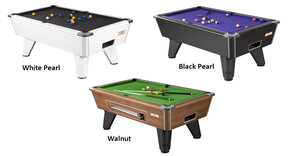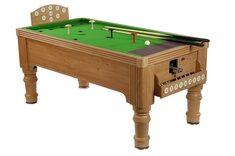The Rules of Life Pool
The following is a basic set of instructions for the friendly play of the game of Life Pool including additional comments designed to assist with the understanding of the game. This is the original English game of Pool - not to be confused with the variety of Pool games invented in America which are played upon smaller tables. The rules have been slightly simplified by the removal of the convoluted "Ball up" rule which is difficult to use without a referee and the "starring" rule - a gambling extra of no great importance. Note: 1 foot = 30.48 cm
See also: Games Tables.
Equipment
Life Pool is played on a full sized Billiards table although it can also be played upon smaller billiard table sizes e.g. 8 x 4 feet or 6 x 3 feet. Life Pool is designed to be played by a group of players and each player has a differently coloured ball. Since most snooker tables these days have 8 different ball colours including white, the largest number of players today is usually 8. During the nineteenth century, various selections of balls were played with depending upon the fashion of the day and what was immediately available. It was common to put a spot on a ball to distinguish it from another ball of the same colour, in the same way as the two white balls in Billiards are distinguished, and in this case, up to 14 balls might be used.
The Start
Life Pool is essentially a gambling game although it can easily be enjoyed without playing for money. A base stake is decided upon and to begin a game, each player pays three times the base stake into a pot of money (the pool) in exchange for three "lives". The same number of balls as players are placed into a bag and each player takes one ball out of the bag at random. The order of play is then decided as follows:
Modern version of Old English Pool
- White
- Red
- Yellow
- Green
- Brown
- Blue
- Pink
- Black
Old English Pool
- White
- Red
- Yellow
- Green
- Brown
- Blue
- Pink
- Spot White
- Spot Red
- Spot Yellow
- Spot Green
- Spot Brown
- Spot Blue
- Spot Pink
Basic Play
Players take turn to play in the above order. If a player's ball is not on the table at the start of their turn, the player places it within the D. A player starts a turn by striking their ball (the cue ball) with the cue aiming to hit the previous player's ball. For instance, the first player to play is Red and the ball aimed at is white. If the previous player's ball is not on the table, then the target ball is the nearest ball to the cue ball and, should the striker's ball also be "in hand", the target ball is that nearest to the middle of the baulk line (middle spot of the D). When a target ball is legitimately potted, the owner of the potted ball pays the striker the base stake. The player is allowed another turn and the new target ball is the ball nearest to the cue ball. When there are no balls remaining on the table, a player's turn is finished and that player must pick up his/her ball and place it on the black spot for the next player to aim at. When a player's ball is potted legitimately, that player loses one life and the ball remains "in hand" until the owner of the ball next comes to the table. Any number of balls can be potted in one stroke provided that the first ball struck by the cue ball was the ball being targeted.
Foul shots
A foul shot incurs a penalty of one life and the payment of a forfeit of one base stake. The following events constitute a foul shot for the player at the table:
- The striker's ball is potted
- The ball that is aimed at by the player's ball is missed
- Another ball is struck before or at the same time as the ball that is being aimed at by the player's ball
- Any ball leaves the table
- A player uses the wrong ball as the cue ball or plays out of turn
- If a player misses the targeted ball and also pots another player's ball in the same stroke, the striker's ball is removed from the table and both balls remain in hand until their owners next visit the table.
- If a player successfully pots the targeted ball but also performs a foul shot in the same stroke, the player whose ball was potted does not lose a life. The potted ball remains in hand until that player next visits the table.
- If more than one foul is committed in a single stroke, only one life is lost and the first foul committed determines who receives the forfeit.
Less oft-used rules
If the cue-ball ever comes to rest touching another ball, a "touching ball" is called and one of the following rules applies:
- If it is the first shot of the turn and the ball being touched is the ball to be played, then the player must take his/her ball and play it from the D.
- Otherwise, the player must play away from the touched ball in order to avoid playing an illegal push shot. The target ball can be potted in the usual way but no penalty is incurred if it is missed completely.
- If the player plays a "push shot". This happens if the targeted ball is close to the cue ball and the cue tip is still in contact with the cue-ball when it strikes the target ball.
- In the case of a "touching ball", the player must play away from the ball - if it moves then it is a push shot and a foul.
- If the cue-ball hops over the ball being aimed at, this is deemed a "jump shot" and is a foul stroke.
- If the cue-ball is struck twice.
- If a ball is touched before it has finished rolling.
- If the player strikes the cue ball without at least one foot touching the floor.
Starring
For game with up to 6 players, a single star is available for purchase by a player who is knocked out. The first player to lose all three lives has the first opportunity to buy the star. If the first player chooses not to buy, the second player to go out has the option in the same way and so on until there are only two players left when the option to buy a star is no longer given. A player who has been knocked out must make the decision to buy the star, if available, before the next stroke. If a player chooses to buy the star, that player pays three times the base stake and for this buys back some lives. The number of lives must be the same as the number of lives owned by the player with the least lives at the time. In a game with 7 players or more, 2 stars are available to be bought but the second star costs 6 times the base stake. It is allowable for the same player to buy both stars.
The End
A player is said to be "dead" when all 3 lives have been lost. In a game of three players or less, the pool of money goes to the sole survivor when the other players are dead. When the game consists of four or more players, once only two players remain, if they have an equal number of lives, the pool is divided between them. When two players remain and one has more lives, the game continues until either one player is victorious or else until both players have an equal number of lives whereupon the pool is shared.
These rules are provided by Masters Traditional Games, an Internet shop selling quality traditional games, pub games and unusual games. For general information or for copying and copyright, see our Rules Information page.
Our rules are comprehensive instructions for friendly play. If in doubt, always abide by locally-played or house rules.
Copyright James Masters, 2025. All rights reserved.


























